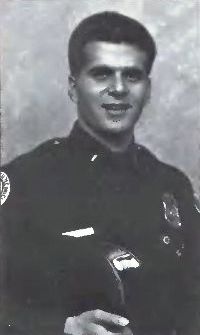![]()
The Words of the Azar Family
|
|
The Words of the Azar Family |

Community service or home-church type work may take unusual forms for some of our Unification Church members. The following article is taken from a speech given by Thomas Azar, state leader in Georgia, explaining to the community some of the insights he has gained through serving as a volunteer police chaplain.
Today the role of police chaplain has graduated from being ceremonial to that of a camaraderie that allows him to witness and experience the heartbeat of the police officer. Upon returning to New York for the holidays, I began to reflect on my childhood and present responsibilities in the light of the murders of several police officers and slayings of children.
I grew up in Queens and Manhattan and lived there for 25 years before moving to Atlanta, Georgia in 1976. I lived next door to a homicide detective and, along with other New Yorkers, saw violence and crime on the city streets. In 1973, after graduating from Hunter College and going into teaching, I decided that the best way to serve my fellow man and try to reduce the rise in crime, family breakdown, drugs, alcohol and immorality was through the ministry. After an intense search, I joined the Unification Church and became a lay missionary working on the upper West Side and Harlem, where I met with many knives, guns and threats. However, God never let my adolescent dream of wearing the blue uniform go unfulfilled. In 1977, after being sent to Georgia, I was sworn in as a chaplain to the Atlanta Police Department.
Since then my eyes continue to be opened. I saw the misuse of love cause husbands and wives to stab and wound each other. I saw the absence of trust between grown brothers and sisters give rise to uncontrollable rage and destruction. I saw ignorance about the value of human life lead a man to rape. I saw the absence of moral upbringing lead 12 and 13 year olds to steal and sell themselves to out-of- town johns. Unfortunately, I even saw religious men pick up police women decoying as prostitutes. It is these experiences that made like realize anew the necessity and importance of religious and moral principles that are alive, workable and able to provide life with meaning and purpose.
A police chaplain's responsibility is primarily with the men and women who work in the Department of Public Safety. As an unpaid public servant working 60 to 80 hours per month, I would ride in uniform together with the officers in the patrol cars. When there is a trusting communication, one learns of the stress and strain that weigh heavily on the knights in blue armor. Behind the uniform, he or she is a fellow human being, with concerned parents, a loving spouse, and children and good friends. While he is overburdened by pressures from home, and because of the uncommon and prolonged hours, he is rarely with the ones he loves. Pressure from his superiors who many times ask the unattainable or push him to the limits. Pressure from the community where narrow views label the police officer more as an invader than a friend who risks his life for those he rarely knows.
All this brought together creates a tidal wave of stress. Unless the cause of this stress is tackled and solved, he begins to suffer from physical and emotional problems or seeks to release them in unhealthy and over reactive ways.
A police officer often develops a variety of emotional problems at home with his family or girlfriend. Many times the officer becomes workaholic or hyper-aggressive, or perhaps the complete opposite, indifferent to his responsibilities. It is here that a chaplain, well trained in pastoral and psychiatric care, can help those who face tremendous pressure from all sectors of society.
A chaplain is a representative of God, a good friend, a spiritual inspirer, and an unselfish example. You find him at the emergency room, behind barricades, at an all-night diner, a funeral parlor, a wedding, and even at your home. Not only must he always he available, and at many places at all times, but he must exemplify a certain character in those various situations. He must be stern in times of conflict, jovial with the good citizen, parental with children or the emotionally disturbed, and sympathetic to the bereaved or confused.
Therefore, the chaplain is a bridge between the hard-working officer and the distant God, unseen family, and antagonistic community he seeks to know and serve.
In my experience, all the employees of the Department of Public Safety have given a warm acceptance to chaplains. There are many elements of commonality between both professions. Moreover, the chaplain who faces trauma together with the police officer can easily check the depth and value of his own religious beliefs and convictions in the face of those whom he serves. Just as gold is tested by fire, so the minister who comes out from behind the stained glass windows and works with his flock on the streets comes to experience first hand the living God trying to give truth and love to all mankind.